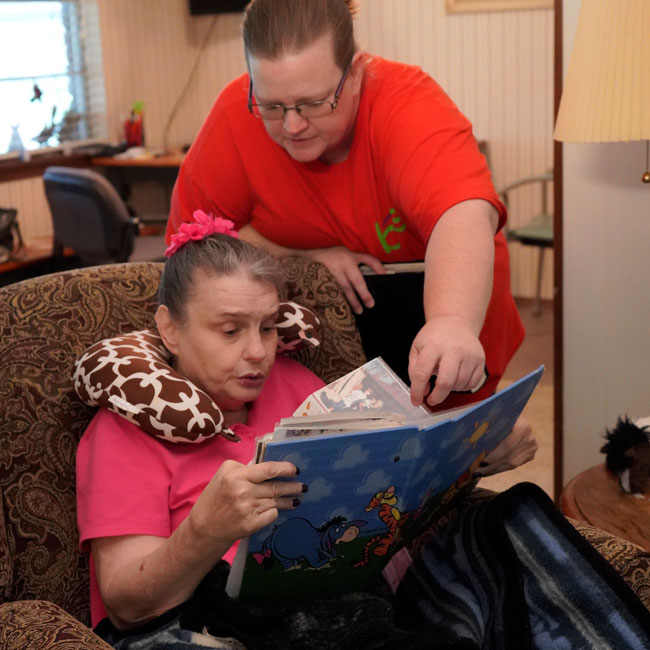What Are Intellectual and Developmental Disabilities (ID/DD)?
Intellectual and developmental disabilities occur before adulthood (typically defined between 18 and 22 years of age) and result in limited intellectual capacity and decreased adaptive behavior. Adaptive behavior refers to a person’s ability to utilize everyday social and practical skills to function independently.
The age of adulthood is generally defined by the state or regulatory body who provides services and/or funding. Intellectual capacity is typically determined by IQ tests, often the Stanford Binet. Most states and regulatory entities define intellectual impairment as an IQ below 70.
In the past, intellectual disability was called mental retardation. Due to the disparaging nature of this term, the ID/DD community has strongly advocated for ending the use of “mental retardation” and its derivatives. Most state and federal regulatory agencies have stopped using “mental retardation.”
Although these types of labels might be useful for regulatory agencies, schools, etc. to determine who qualifies for funding and supports, at Bios we believe:
- Labels provide little in the way of helping supporters understand how to best support people with different learning styles, sensory differences, sensory processing differences or physical limitations.
- The typically used assessments, such as IQ tests put people with sensory, communication and sensory processing differences at an unfair disadvantage and are unlikely to accurately represent their capacity to learn.
- Developmental disability is more of an umbrella term that may include intellectual disability, but also includes other disabilities that are noticed during childhood and result in development that is viewed as atypical from most children. Examples include cerebral palsy, autism spectrum disorder, developmental delay, fetal alcohol syndrome, epilepsy, Down Syndrome, etc.
Everyone with intellectual disability that occurs before adulthood is considered to have a developmental disability, but not everyone with a developmental disability has an intellectual disability.
People can develop intellectual disabilities after childhood from trauma, traumatic brain injuries, hypoxia, drug or alcohol abuse, etc. These disabilities are not developmental in nature.
How does BiosHome support people with ID/DD?
BiosHome provides residential and community support for people with ID/DD, which includes cerebral palsy, autism spectrum disorder, developmental delay, fetal alcohol syndrome, epilepsy, Down Syndrome, etc.
Residential Support
Residentially, we can help people find homes and housemates and help them set up and maintain their homes. Based on the supports they want and need, we assist with or provide:
- Personal care: bathing, dressing, grooming. Looking your best is an important part of being valued by the people around you. Bios staff support people in all aspects of personal care to promote their health, self-esteem and value in the world.
- Homemaking: cooking, cleaning, guest hosting, shopping, errand running. Everybody wants a healthy, safe and happy home. Bios staff support people in planning and preparing healthy meals, keeping their home clean, welcoming and warm and shopping and running errands to keep their home life running well.
- Healthcare coordination: medication administration, appointment scheduling and management, liaison with healthcare providers, home therapies, transportation to appointments, etc. Health care can be challenging for anyone, but people with ID/DD tend to have higher healthcare needs that most people. Our staff are trained to understand each person’s specific healthcare needs and to provide and document the appropriate supports they need to maintain their optimal health.
- Financial management: organizational payee service for Social Security Income, bill payment, household budget development and management. People with disabilities usually qualify for Social Security Income. Most people with ID/DD have difficulty managing money on their own to ensure their needs and wants are met. Bios can serve as organizational payee for people who receive our residential services. If you choose for Bios to be your organizational payee, you give Social Security permission to send your funds to us. We set up a “representative payee” account for you and our finance department uses the money to pay your rent, utilities and other expenses and with the remaining money, we work with you to develop a household budget. Budget funds are loaded onto a Purchasing Card (P-card) every two weeks. Our staff can assist you in using your P-card to buy groceries, personal supplies and to pay for your recreational and entertainment activities.
- Communication skill development: Developmental delays often result in delayed development of verbal communication skills. Motor and sensory limitations can negatively impact people’s ability to use verbal communication and their primary way of interacting with other people and controlling their worlds. Bios works with people to understand their unique ways of communicating and to help them find ways to communicate with others to improve their connections with the world.
- Social skill development: We all want friends and we all want to be valued by other people in the world. Other people expect us to be polite and respectful and to follow the social norms of our respective communities. Bios staff work to help people understand and practice social skills so they are better able to connect with and be valued by other people in the world.
- Interpersonal relationship skill development: Relationships with other people are important to our health and well-being. Bios staff help people learn and practice the interpersonal skills needed to develop and maintain relationships with friends, family members and significant others.
Community Support
BiosHome helps people navigate their communities including shopping, church, clubs, parks, museums, arenas, sporting events, concerts, school, etc. We support them by providing transportation, helping them learn and practice the social norms for the different places they go, helping them use equipment or strategies to physically navigate space away from home helping them manage the financial aspects of participating in the community, such as paying tabs, counting change, using P-cards, writing check, etc.
https://aaidd.org/intellectual-disability/definition/faqs-on-intellectual-disability
https://www.thearc.org/learn-about/intellectual-disability
https://report.nih.gov/nihfactsheets/ViewFactSheet.aspx?csid=100
